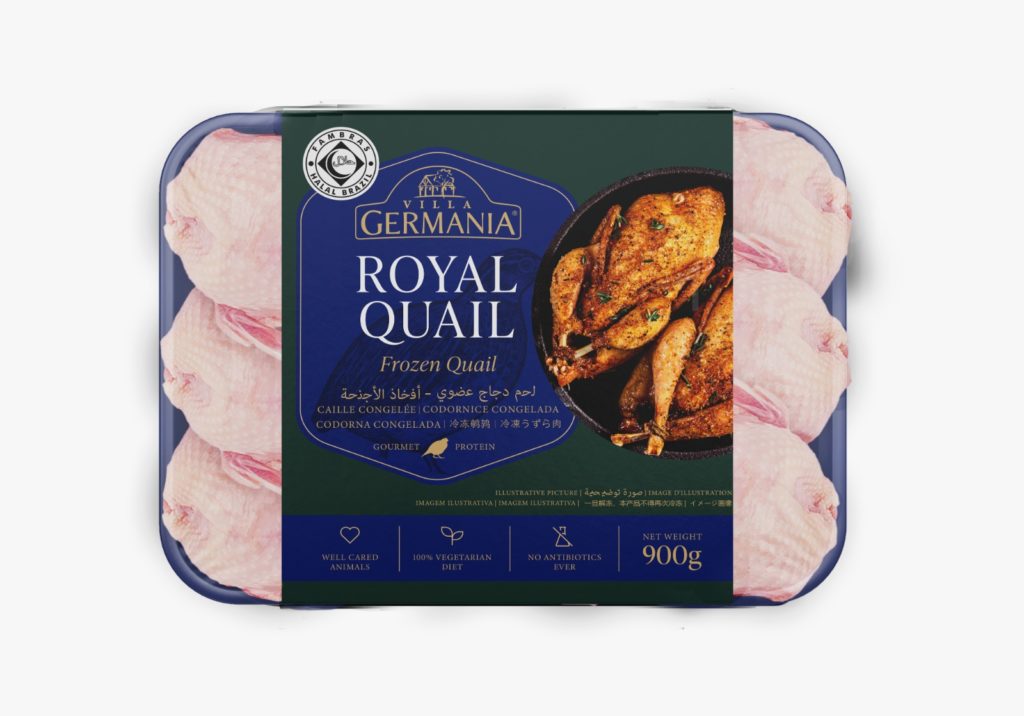São Paulo – Good Alimentos, a slaughterhouse based in the municipality of Coronel Freitas, Santa Catarina, Brazil, is about to become the first Brazilian firm to export quail meat to Arab countries.
The plan is to perform the first slaughters and exports in the second half of April, Villa Germânia & Good Alimentos CEO Marcondes Moser said. “The first importer of Good Alimentos will be the Middle East market – particularly Qatar, the United Arab Emirates, and Kuwait,” he told ANBA.

The first sales to Arab countries were made during the trade show Gulfood, held last February in Dubai, UAE, where the company was at the pavilion held by the Brazilian Trade & Investment Promotion Agency (ApexBrazil).
To start exporting, the firm first had to obtain the Federal Inspection Service (SIF) and halal certifications. The first was granted by the Ministry of Agriculture, Livestock and Supply of in January 2023. The latter came two months later. The last step before shipping the birds is allocating a veterinarian in the facility for the actual export production.
“After requesting the Agriculture Minister’s certification, we sent them projects to get their ok. Then we invested some BRL 2 million (USD 381,300) to fit the plant and slaughterhouse to the requirements. When we received their approval, we went on to auditing to get the halal certification,” Moser said.
To get halal, the Brazilian firm had first to follow some requirements on slaughtering, and the Islamic rite, such as putting the bleeder turned to Mecca, the holy city of Islam. When all was ready, the inspector of Fambras Halal certifier audited it and gave the certification.
Despite being three times more expensive than chicken meat, quail meat is part of the Arab consumer’s culture. “It’s a niche item, so they are not consumed in everyday life,” Moser said.
Production and exports
When it was established in 2017 by Valmor Masson, the company’s current managing director, and the Cavazzoto family, Good Alimentos used to slaughter some 5,000 to 6,000 quails a day to be distributed mainly to the Southern region of Brazil, the states of Santa Catarina, Rio Grande do Sul and Paraná, as well as some Northeastern states such as Bahia, Pernambuco and Piauí.
In six years, production jumped to 15,000 a day, about two tonnes. As exports start, the volume is expected to nearly double by the end of 2023: 25,000 slaughters, around 3.5 tonnes per day. To meet this demand, the plant has 60 employees.

In the medium term, Good Alimentos exports could reach countries in Asia like Japan and Singapore, Europe, as well as the United States and Canada in the Americas. Altogether 20 to 30 countries will be catered by the Brazilian company.
In the future, Moser explained they could further increase the capacity of the slaughterhouse to 40,000 quails, that is 5 tonnes of birds per day.
Currently, the slaughterhouse is controlled by XWR Investimentos, which bought 76% of its shares. Besides Good Alimentos, the holding is also the majority shareholder of Villa Germânia, an exporter of duck, guinea fowl, and organic and free-range chicken, based in the city of Indaial, Santa Catarina.
Relationship with Arabs
Although the first sales of quails to the Arab market have occurred only in 2023, the relationship between the Brazilians and the Arabs goes back a long way. XWR Investimentos used the trade ties of Villa Germânia to put Good Alimentos on the front line as an exporter. “Villa Germânia has exported ducks to the Arabs since 2006, so it was easy to add this new product for them as well,” Marcondes said.
Furthermore, the holding will also use the relationship between Villa Germânia and consumers in the Middle East to take the exports of Good Alimentos. All production is carried out by the firm based in Coronel Freitas, but the stamps printed on the quail packages will be of Villa Germânia, to earn recognition and trust.
So far, Villa Germânia has reached many destinations, including Qatar, the UAE, Kuwait, Saudi Arabia, Japan, Singapura, Angola, Chile, Argentina, Hong Kong, Mauritius, and Cape Verde.
Moser explains that since Brazil has a great expertise in poultry exports, Villa Germânia stepped into the stream by visiting fairs and networking with importers. “The quail arrive to be part of this product mix that the investor is unveiling, turning it into an export platform, adding one more noble product to the gourmet proteins,” he said.
Report by Rebecca Vettore, especially for ANBA
Translated by Guilherme Miranda & Elúsio Brasileiro




